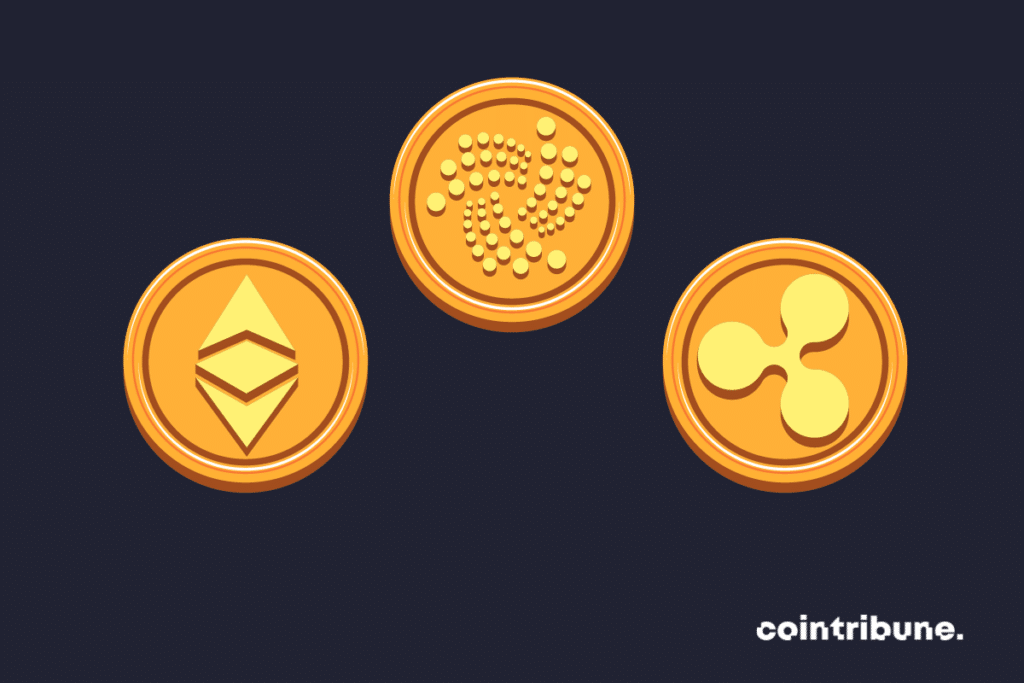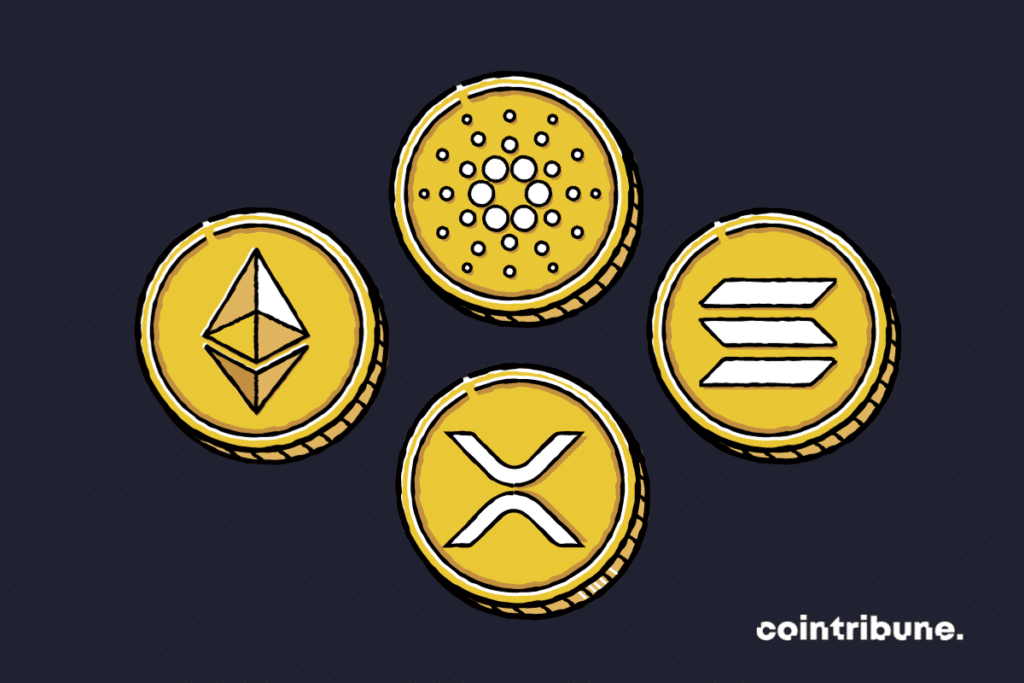Altcoins: How to Secure Them?
The rise of altcoins marks a notable evolution in the cryptocurrency space. As their popularity grows, investors face unique challenges, including market volatility and security concerns. These issues raise significant concerns about the best way to protect and manage investments in this sector. Faced with these challenges, investors must equip themselves with knowledge and seek suitable strategies to safeguard their cryptocurrencies from any threats. This article thoroughly addresses the risks associated with altcoins, provides practical solutions to secure them, and offers advice on best investment practices.

Key Takeaways on Altcoins
Altcoins are cryptocurrencies other than Bitcoin, the first and most well-known digital currency. These altcoins, such as Ethereum, Ripple’s XRP, and Litecoin, operate on principles similar to Bitcoin. They utilize blockchain technology to secure and record transactions. Each altcoin has its own characteristics and utilities, with some offering faster transaction speeds while others focus on privacy or interoperability with other blockchains.
Why Invest in Altcoins?
Altcoins, or alternative cryptocurrencies to Bitcoin, have garnered increasing interest in the cryptocurrency investment world. Here’s why many investors are choosing these cryptos:
High Growth Potential
Altcoins are often seen as having higher growth potential than Bitcoin due to their lower initial market capitalization. This means that even small market movements can lead to proportionally larger gains. For example, cryptocurrencies like Ethereum have shown remarkable growth potential, offering significant returns to investors. Additionally, some altcoins are at the forefront of technological innovation, providing unique solutions to various problems, which can increase their value as these innovations are adopted. However, it’s important to note that this potential growth comes with increased volatility, requiring a cautious and informed investment approach.
Diversity and Investment Options
Unlike Bitcoin, which dominates the cryptocurrency market, altcoins offer much greater diversity, each with its own characteristics and use cases. This diversity allows investors to choose from a wide range of options based on their risk preferences, technological interests, and investment goals. For example, currencies like XRP are designed to optimize international transactions, while others like Litecoin offer faster transaction speeds. Investing in a variety of altcoins can also help diversify a portfolio, reducing overall risk and providing exposure to different facets of the cryptocurrency market.
Technological Innovation and Adoption
Altcoins play a crucial role in innovating and adopting blockchain technology. Many of them are experimenting with new features, such as Ethereum’s smart contracts, which have paved the way for decentralized applications (dApps) and decentralized finance (DeFi). These innovations can transform various sectors, from finance to logistics, and investors who support these technologies can benefit financially while also contributing to the advancement of these revolutionary applications. Additionally, as these technologies gain adoption, demand for associated altcoins may increase, potentially leading to appreciation in their value.
Role in Portfolio Diversification
Investing in altcoins can play an important role in diversifying an investor’s portfolio. By adding altcoins to a portfolio, investors can reduce their reliance on the performance of a single cryptocurrency like Bitcoin. This diversification can help mitigate risks associated with cryptocurrency market volatility. For example, if Bitcoin experiences a downturn, some altcoins may potentially maintain or increase their value, depending on their unique characteristics and independence from Bitcoin. However, it’s crucial to conduct thorough research and understand the specific risks associated with each altcoin before including them in an investment portfolio.

Risks Associated with Altcoins
Altcoins, while representing an innovative investment opportunity in the cryptocurrency world, come with significant risks. These risks, often underestimated by new investors, can significantly impact the value and security of their investments.
Market Volatility and Risks
Volatility is an inherent characteristic of altcoins and cryptocurrency in general. Unlike traditional currencies or other forms of investment, altcoin prices can experience extreme fluctuations in a short period. This instability is often fueled by factors such as regulatory announcements, technological developments within the blockchain, or speculative market trends. Investors must be aware that the value of their altcoin assets can increase or decrease dramatically over time, requiring a thoughtful investment approach and adequate risk tolerance.
Security Risks
Altcoins are subject to various security risks. Hacker attacks, security vulnerabilities in cryptocurrency wallets, and scams are real threats. Investors must be particularly vigilant about the security of their wallets and private keys. A compromised wallet or leaked private key can result in the total loss of funds. Additionally, exchange platforms are not immune to security breaches, and cases of hacking resulting in substantial losses are not uncommon. Selecting secure wallets and adopting good digital security habits are necessary to protect altcoin investments.
Regulatory Risks
Altcoins operate in a regulatory environment that is still being defined. Government regulations regarding cryptocurrencies vary significantly from one country to another and are subject to rapid change. These regulatory uncertainties can directly impact the value and legality of altcoins. For example, an announcement of strict regulation or a ban in a major market can lead to a significant price drop. Therefore, investors must stay informed about regulatory developments in relevant jurisdictions and be prepared to adjust their investment strategies accordingly.
Liquidity Risks
Liquidity is another significant risk factor for altcoin investors. Unlike Bitcoin, which enjoys widespread acceptance and high transaction volumes, many altcoins suffer from limited liquidity. This means that in some cases, it may be challenging to sell or exchange significant amounts of altcoins without significantly affecting their market price. This situation is particularly problematic in volatile market scenarios where many investors seek to sell their altcoins simultaneously. Low liquidity can therefore limit investors’ ability to react quickly to market changes or realize profits.
Securing Altcoins: Practical Solutions
In the world of cryptocurrencies, securing altcoins is a major concern for investors. With the increase in cyberattacks and frauds, it’s important to adopt robust security measures to protect your investments. Here are four practical solutions to effectively secure your alternative cryptocurrencies.
Use of Cold Wallets
Cold wallets are considered one of the safest methods for storing altcoins. Unlike hot wallets, which are connected to the internet and thus susceptible to compromise, cold wallets store private keys offline. This makes them inaccessible to hackers. Hardware wallets, physical devices designed to securely store private keys, are a popular option. They offer a combination of security and convenience, allowing users to make transactions without exposing their private keys. Paper wallets, while less convenient, are another form of cold wallet, offering a physical printout of private keys and public addresses, thus eliminating online hacking risks.
Securing Online Wallets
While online wallets offer convenience for daily transactions, they require additional security measures. Using two-factor authentication (2FA) is crucial to add an extra layer of security. It ensures that even if a password is compromised, unauthorized access to the wallet remains difficult. Passwords should be strong, unique, and regularly updated. It’s also important to ensure that the online wallet is hosted on a reputable platform that uses robust security protocols, such as SSL/TLS encryption, and has a history of resistance to attacks. Users should also be vigilant against phishing and scams, always verifying the authenticity of websites and communications related to their cryptocurrency wallets.
Software Updates and Security Maintenance
Regular maintenance and software updates are important for altcoin security. Wallets and associated software should be kept up to date with the latest versions, which often include patches for recently discovered security vulnerabilities. Users should also be aware of the security of their own computer or mobile device. This includes using reliable antivirus software, conducting regular scans for malware, and keeping the operating system and other software up to date. Regularly backing up private keys and recovery information is also crucial, using secure methods such as encrypted hard drives or offline storage locations.
Education and Security Awareness
The last line of defense in securing altcoins is education and awareness. Investors must stay informed about the latest trends in cryptocurrency security and new methods of attack. Participating in community forums, following cryptocurrency security experts, and subscribing to reliable news sites are excellent ways to stay informed. Understanding the basics of blockchain and cryptocurrencies can also help identify effective security practices and recognize potential warning signs. Finally, it’s important to develop a skeptical and cautious mindset, avoiding offers that seem too good to be true and always verifying the sources of information.
Best Practices for Safe Investing in Altcoins
Investing in altcoins can be a lucrative endeavor, but it requires a careful and informed approach. Given the volatile and sometimes unpredictable nature of the cryptocurrency market, adopting prudent investment strategies is crucial to minimize risks and maximize potential returns. Here are the best practices for safely investing in altcoins.
Thorough Research and Analysis
Before investing in an altcoin, it’s important to conduct thorough research and analysis. This involves understanding the fundamentals of the chosen cryptocurrency, including its economic model, use case, the strength and experience of its development team, and its position in the market. It’s also important to review the cryptocurrency’s white paper, which provides details on its technology, governance, and future plans. Analyzing market trends, transaction volumes, and price fluctuations can also provide valuable insights into the stability and long-term viability of the altcoin. Additionally, staying informed about the latest news and developments in the cryptocurrency space can help anticipate market movements and make informed investment decisions.
Investment Diversification
Diversification is a key strategy for managing risks. Rather than putting all eggs in one basket, it’s advisable to spread investments across multiple altcoins and asset classes. This can help mitigate losses if a particular altcoin or segment of the cryptocurrency market experiences a downturn. Diversification can also include investments in more stable assets, such as Bitcoin or even traditional assets like stocks or bonds. It’s important to choose altcoins with different risk profiles and not focus solely on cryptocurrencies with high valuations or media popularity.
Prudent Portfolio Management
Prudent portfolio management is essential to maintaining the security and health of your altcoin investments. This involves setting clear investment goals and defining strategies to achieve them. It’s important to regularly monitor the performance of your portfolio and adjust your investments based on market changes and personal goals. Using portfolio management tools can help track performance and make informed decisions. Additionally, it’s important to know when to exit an investment. Setting loss limits and profit targets can help make rational decisions without being influenced by emotions such as fear or greed.
Continued Education and Caution
Continued education is a fundamental aspect of safe investment in altcoins. The cryptocurrency market evolves rapidly, and it’s important to stay up to date with the latest trends, technologies, and regulations. Participating in online forums, taking courses, reading specialized articles, and listening to podcasts can provide valuable information and diverse perspectives. Additionally, it’s important to adopt a cautious approach and not succumb to impulsive investment strategies or promises of quick returns. Understanding the risks, being skeptical of potential scams, and investing only what you can afford to lose are key principles for safe investment in altcoins.
Conclusion
Investing in altcoins presents an interesting opportunity in the digital financial landscape, but it requires a careful and well-informed approach. Investors must be aware of the inherent volatility of these assets, the security challenges they present, and the crucial importance of diversifying their portfolios. A thorough understanding of risks and the specific characteristics of each altcoin is essential. By adopting effective security strategies and staying constantly informed, investors can better manage risks and maximize the potential of their altcoin investments.
Maximize your Cointribune experience with our "Read to Earn" program! For every article you read, earn points and access exclusive rewards. Sign up now and start earning benefits.
The Cointribune editorial team unites its voices to address topics related to cryptocurrencies, investment, the metaverse, and NFTs, while striving to answer your questions as best as possible.
The views, thoughts, and opinions expressed in this article belong solely to the author, and should not be taken as investment advice. Do your own research before taking any investment decisions.